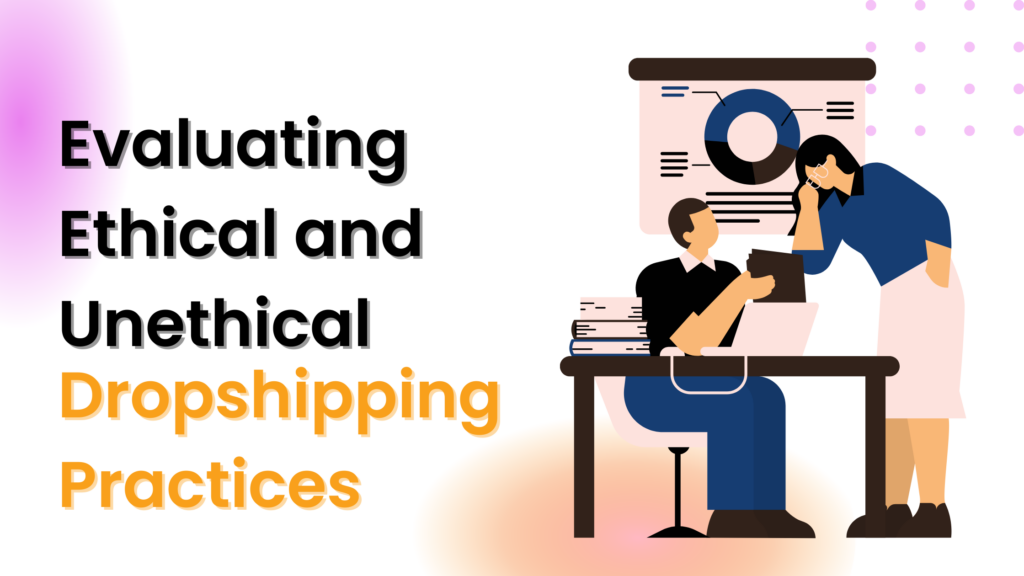Evaluating Ethical and Unethical Dropshipping Practices
Dropshipping, a popular ecommerce model, offers entrepreneurs a low-risk entry into online retail. However, alongside its advantages come ethical considerations that shape the industry’s reputation and impact. In this discussion, we delve into the spectrum of ethical and unethical practices within dropshipping.
From transparent dealings with customers and suppliers to the repercussions of misleading marketing tactics and counterfeit products, understanding these practices is pivotal. By evaluating the ethical landscape, businesses can navigate with integrity, fostering trust, and sustainable growth in the dynamic world of dropshipping.
Understanding Dropshipping
Dropshipping is an ecommerce fulfillment method where online retailers (dropshippers) sell products to customers without physically handling inventory. Instead, they partner with suppliers who ship products directly to customers on behalf of the retailer. There are 3 key players namely:
- Dropshippers: These are the online retailers who market and sell products to customers through their ecommerce platforms.
- Suppliers: Suppliers are the companies or individuals who provide the products and fulfill orders on behalf of dropshippers.
- Customers: Customers purchase products from dropshippers and receive them directly from the suppliers.
Advantages of dropshipping include minimal startup costs, as it requires little upfront investment compared to traditional retail models. Dropshippers also benefit from a wide product selection, as they can offer a diverse range of products without managing inventory. Additionally, dropshipping offers flexibility, allowing entrepreneurs to operate from anywhere with an internet connection.
However, dropshipping also presents some disadvantages. Dropshippers typically experience lower profit margins compared to retailers who purchase inventory in bulk. Additionally, dropshippers have limited control over inventory and shipping, relying on suppliers for these aspects, which can lead to issues such as stockouts or shipping delays. Moreover, the ease of entry into dropshipping has resulted in increased competition and market saturation in some niches, making it challenging for dropshippers to stand out.
What are Ethical Dropshipping Practices in Dropshipping?
Ethical dropshipping practices are essential for building trust and credibility in the ecommerce industry. They encompass several key principles:
Transparency and honesty in product descriptions and pricing: Ethical dropshippers provide accurate and detailed descriptions of their products, including any potential limitations or drawbacks. Pricing is transparent, with no hidden fees or deceptive tactics.
Ensuring product quality and customer satisfaction: Ethical dropshippers prioritize the quality of their products and go the extra mile to ensure customer satisfaction. This includes offering refunds or replacements for defective items and providing excellent customer service.
Fair treatment of suppliers and maintaining good relationships: Ethical dropshippers treat their suppliers with respect and fairness. They pay suppliers promptly and communicate openly to maintain positive long-term relationships.
Respect for intellectual property rights and trademarks: Ethical dropshippers respect the intellectual property rights of others and do not sell counterfeit or unauthorized products. They obtain proper licensing and permissions for the products they sell.
Providing accurate shipping information and delivery times: Ethical dropshippers provide customers with accurate shipping information and realistic delivery estimates. They strive to meet or exceed these expectations to ensure a positive shopping experience for their customers.
What are Unethical Dropshipping Practices in Dropshipping?
Unethical Dropshipping Practices in Dropshipping:
Misleading advertising and false promises: This involves exaggerating product claims or offering unrealistic guarantees to lure customers, leading to dissatisfaction and mistrust.
Selling counterfeit or low-quality products: Providing customers with substandard or fake items not only damages the brand’s reputation but also violates consumer rights.
Exploiting suppliers by demanding unreasonable terms or withholding payments: Unfair treatment of suppliers, such as imposing unjustified fees or delaying payments, can harm relationships and disrupt supply chains.
Violating intellectual property rights by selling copyrighted or trademarked items without authorization: Unauthorized use of intellectual property undermines the rights of creators and can result in legal repercussions.
Engaging in deceptive marketing tactics to manipulate customers: Tactics like fake scarcity, misleading pricing, or false endorsements deceive customers, eroding trust and integrity in the marketplace.
What is the Impact on Reputation and Brand Image?
Maintaining ethical standards in dropshipping is crucial for preserving a brand’s reputation and credibility. When businesses prioritize honesty, transparency, and fair dealings with customers and suppliers, they establish themselves as trustworthy entities in the market.
On the contrary, engaging in unethical practices, such as misleading advertising, delayed shipping, or selling counterfeit goods, can severely damage a brand’s reputation. Negative reviews, complaints, and social media backlash can quickly tarnish the image of a business, leading to a loss of customer trust and loyalty.
By upholding ethical principles, businesses can build long-term relationships with customers based on integrity and reliability, fostering a positive brand image and ensuring sustainable success in the ecommerce marketplace.
What are the Responsible Dropshipping Strategies?
By implementing the following responsible dropshipping strategies, businesses can build a reputation for integrity, reliability, and customer satisfaction. This not only fosters trust and loyalty among customers but also promotes long-term success and sustainability.
Conducting due diligence when selecting suppliers:
- Thoroughly research potential suppliers, evaluating their reputation, reliability, and product quality.
- Verify their credentials (e.g. via digital credentials), including certifications and compliance with industry standards.
- Assess their ethical practices and commitment to fair labor and environmental standards.
Establishing clear communication channels with suppliers and customers:
- Maintain open and transparent communication with suppliers to foster trust and collaboration.
- Establish clear terms and expectations regarding product quality, shipping times, and returns.
- Provide accessible channels for customers to reach out with inquiries, feedback, or concerns.
Implementing quality control measures to ensure product standards:
- Regularly monitor product quality through inspections and testing procedures.
- Set quality benchmarks and hold suppliers accountable for meeting these standards.
- Address any quality issues promptly, taking corrective action to maintain customer satisfaction.
Providing excellent customer service and addressing concerns promptly:
- Offer responsive and helpful customer support to assist with inquiries, orders, and returns.
- Handle customer complaints or issues with empathy, professionalism, and a focus on resolution.
- Proactively communicate with customers about order status, shipping updates, and any potential delays.
Staying informed about industry trends and best practices:
- Continuously educate yourself about evolving trends, technologies, and consumer preferences in the dropshipping industry.
- Stay updated on regulatory changes, market dynamics, and emerging opportunities.
- Engage with industry forums, attend conferences, and network with peers to exchange insights and strategies.
Conclusion
In conclusion, ethical considerations play a crucial role in the success and sustainability of dropshipping businesses. By adhering to ethical principles, businesses can build trust with customers, foster positive relationships with suppliers, and safeguard their reputation in the marketplace.
Ultimately, practicing ethical dropshipping not only benefits individual businesses but also contributes to a more transparent and trustworthy ecommerce ecosystem overall. As the industry continues to evolve, prioritizing ethics and integrity will remain essential for long-term success in dropshipping.





